Tuesday, December 17, 2024
Stand with Cuba Against the Blockade and
in
Her Disaster Recovery Efforts
10th Anniversary of the Liberation of
the
Cuban Five
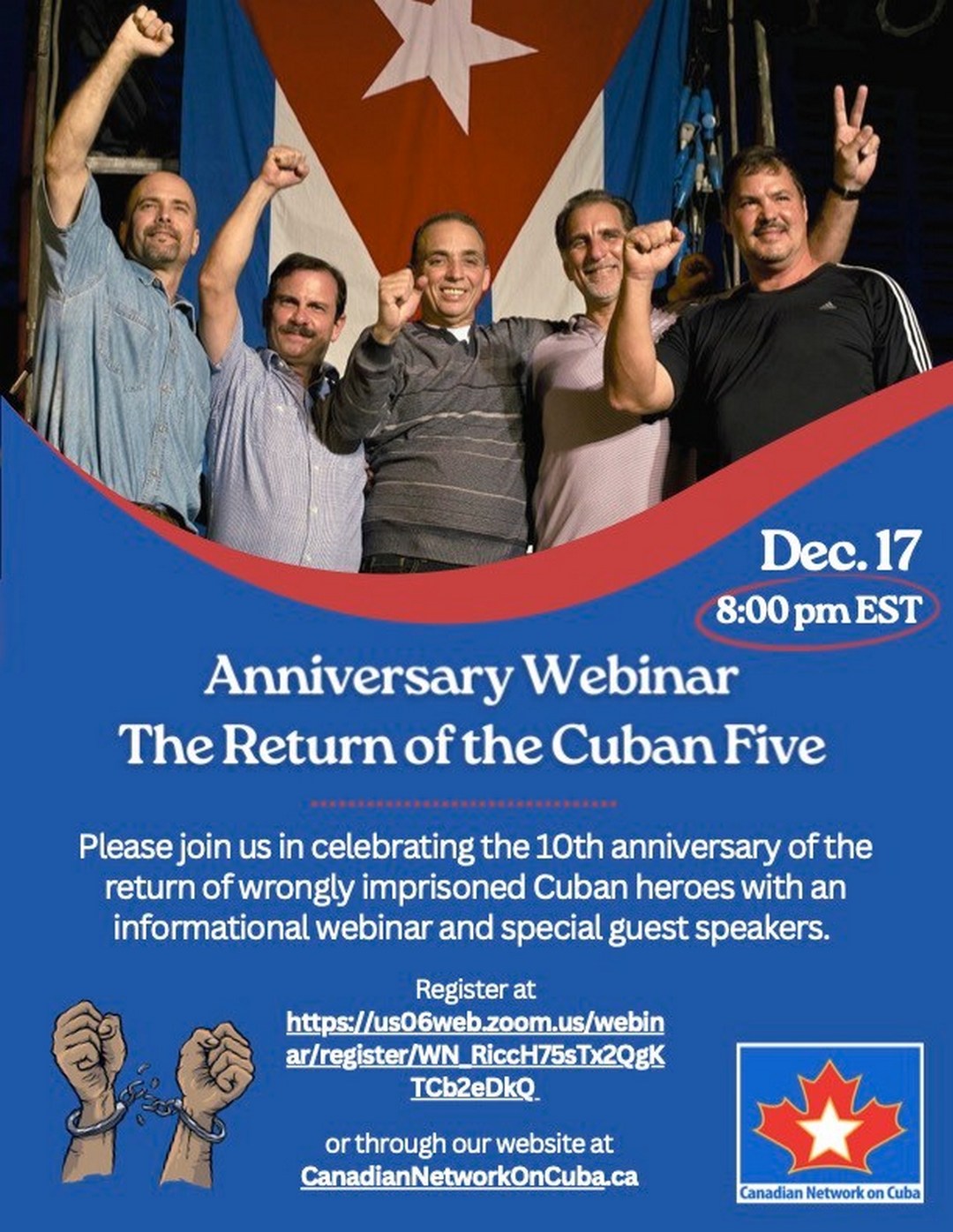
Click
to enlarge.
• Appeal from Communist Party of Cuba
• "Here We Are on Our Feet, Fighting"
• Visits to Provinces Show People's
Creativity and
Wisdom in Challenging
Times
• Ottawa Discussion on Current Situation
in Cuba with
Representative of
Cuban Embassy
• Toronto Forum on Cuba Honours Fidel Castro
Stand
with Cuba Against the Blockade and in Her
Disaster Recovery
Efforts
All Out to End the U.S. Blockade and Remove
Cuba
from Illegitimate List of So-Called Sponsors
of Terrorism!
It Can Be Done!
|
On December 20, the Cuban people will hold a grand march in Havana on the seafront to demand the end to the U.S. blockade of Cuba and for Cuba to be removed from the illegitimate list of so-called terrorist states. Adding Cuba to that list and keeping it there, despite the fact that it is Cuba which is a victim of terrorist crimes incited by the United States, is an openly counter-revolutionary action to make economic conditions so bad in that country that the declared U.S. aim of engineering a mass uprising of the Cuban people to overthrow the government would be realized and the U.S. could achieve its century-old dream of taking over Cuba.
CPC(M-L) calls on Canadians and Quebeckers to go all out at this time to raise the call in Canada for Cuba to be removed from the egregious list of states which sponsor terrorism. Now that the U.S. has been flagrantly caught setting up a terrorist organization to take over Syria and that its "War on Terror" has bitten the dust, just as its claims to be motivated by humanitarian concerns has bitten the dust in Gaza, it is high time that Canada stop appeasing the U.S. through third party implementation of its blockade against Cuba and demand Cuba be removed from the list of state sponsors of terrorism.
The only way to deal with the United States is defy its illegal positions. No amount of appeasement brings Canada honour or upholds its dignity.
All out to support the Cuban people in their life and death struggle against the nefarious consequences of the blockade and to defeat the blockade and remove Cuba from the illegitimate list of states which sponsor terrorism.
It
Can be Done! It Must Be Done!
Long Live Revolutionary Cuba!
Long
Live the Heroic Cuban
People!
Appeal from Communist Party of Cuba
To political parties, social and popular movements, progressive and left-wing forces, and the world movement of solidarity with Cuba.
To friends of Cuba in the world in general.
Since the previous administration of President Donald Trump, measures of the economic, commercial, and financial blockade imposed by the U.S. government against Cuba since 1962 have been intensified in an unprecedented manner. With the implementation of more than 240 measures, chapter III of the Helms-Burton Act and its growing extraterritoriality, to which was added the fierce campaign of disinformation and promotion of internal destabilization, they intend to reverse our revolutionary process.
As a consequence of this criminal and genocidal policy, the Cuban people have suffered significant repercussions in their daily lives; this has been exacerbated by the impact of the energy crisis experienced by our country, due to financial persecution, the impossibility of purchasing fuels, parts and inputs for the maintenance of our national electro-energetic system. The serious damage caused to our economy by this new contingency has been doubly reinforced by the occurrence of climatic events such as Hurricanes Oscar and Rafael, as well as two large-scale earthquakes in less than 15 days.
Despite the difficult situation, the Cuban people, together with their party and government, are stoically resisting, where solidarity and resilience have prevailed together with our perseverance to recover and continue the construction of a more just, humane and solidary society. In this endeavor, we turn to you once again to seek the maximum of your solidarity efforts in the political, economic, and material spheres.
Cuba will never give up and we hope to count on the accompaniment and support of all our friends so that together with our people, we can continue the struggle for a better world that is possible. Solidarity cannot be blockaded.
"He who stands up today for Cuba, stands up for all times." – José Martí
We Shall Overcome!
"Here We Are on Our Feet, Fighting"
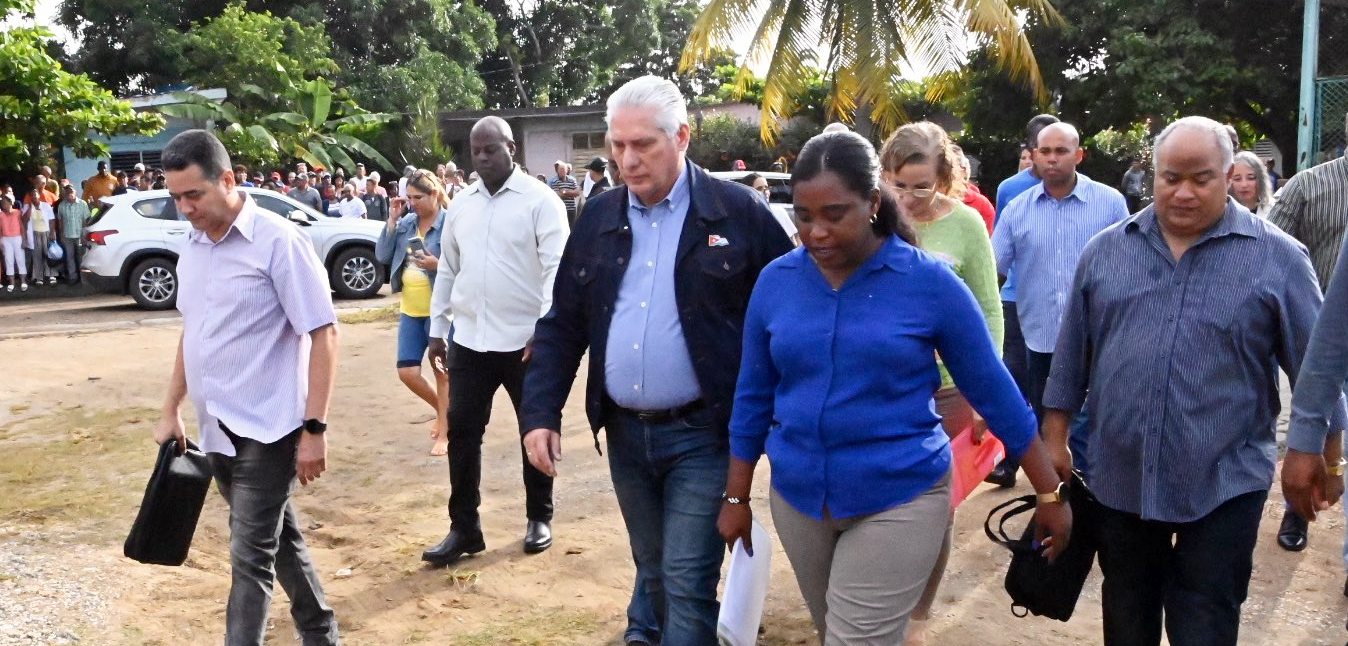
Cuban
President Miguel Díaz-Canel Bermúdez visits city
of Camagüey, November 28, 2024.
The challenges Cuba is facing stemming from the U.S. blockade and two major hurricanes and two earthquakes in quick succession, all imposing greater difficulties for the National Electro-Energetic System, have been taken up by the Cuban people with wisdom, creativity, and confidence.
Since January 2024, every month, together with leadership from the national and local governments and the Communist Party of Cuba, Cuba's President Miguel Díaz-Canel visits factories, farms, and communities in every province. That experience has brought out that while there are many problems, the potential for solving them is also evident. This potential does not come out of nothing but out of positive, concrete experiences where collectives of the people are making advances despite all the limitations. During his visits Díaz-Canel brings to the fore that the positive results are palpable.
Speaking November 28 in the city of Camagüey, he elaborated on the struggle being waged and on relations with the U.S.
"Here we are on our feet, fighting," he said, and expressed the conviction of the people that the current difficulties are surmountable. This has to do with the heroism of the people and the legacy of the Revolution, which has provided a solid foundation.
In Camagüey, which is also the capital city of Camagüey province, he visited the "Victoria de Girón" neighborhood of the Lenin-Albaisa Popular Council. He told residents that during these challenging times "we are doing more community work than in other times." He encouraged everyone to make proposals concerning priorities. The community is one where changes have been made for the functioning of social policies, efficiency of basic services and the spiritual well-being of the people.
He went on to emphasize that the visits are part of a work system designed to see "how we are following up on the main problems of economic and social development, and how we are ratifying the conviction we have, from what we see in provinces and cities, that such difficult times as these can be overcome with work, with talent, with intelligence, with innovation, and above all with your participation."
In each province, he explained, "we see places that work badly, but we also see places that work well. They have the same limitations as all the others: they lack fuel, they lack resources, they lack supplies." However, the leadership provided is different, including listening to the workers. The people, rather than complaining, propose innovative solutions for solving problems.
He also spoke about the election of Donald Trump, saying there are some who are announcing this means the end of the Revolution. "We have received this result with tranquility, without astonishment," he said. Cuba uses her experience and history of making all the preparations needed to today be fully prepared to counter any potential U.S. interference or intensification of the blockade.
The U.S. uses the blockade to try and bring Cuba to her knees, but despite the great difficulties imposed, and more than $1 trillion in economic losses over the years, she has stood firm and remains an inspiration to the peoples of the world.
Díaz-Canel elaborated on this. He explained, "We are facing an economic war, and yet we are here." He said Cuba's programs for development do not yield substantial results in days or weeks, but discrete results are already visible, as his visits around the country have shown. He also brought out that there is a whole group of investments and programs in alliance with friendly countries, which will also give positive results.
The president brought out that Cuba is not alone, giving the example of how the world's peoples and votes by the UN General Assembly have repeatedly condemned the U.S. blockade against Cuba, and call for it to end. He also reiterated that "We will not allow interference in our internal affairs, no matter who it comes from." He said Cuba will uphold her construction of socialism, and the prosperity it has created.
He added, "We once again ratify that we have nothing against the American people." In terms of relations with the U.S. government he said, "We are open to dialogue and debate but without preconditions." Cuba wants to establish "a civilized relationship," based on recognizing that "we have and will always have ideological differences, but we can have neighbourly relations."
(Granma and website of the
Cuban Presidency, with translations from the original Spanish by TML.)
Visits to Provinces Show People's Creativity and Wisdom in Challenging Times
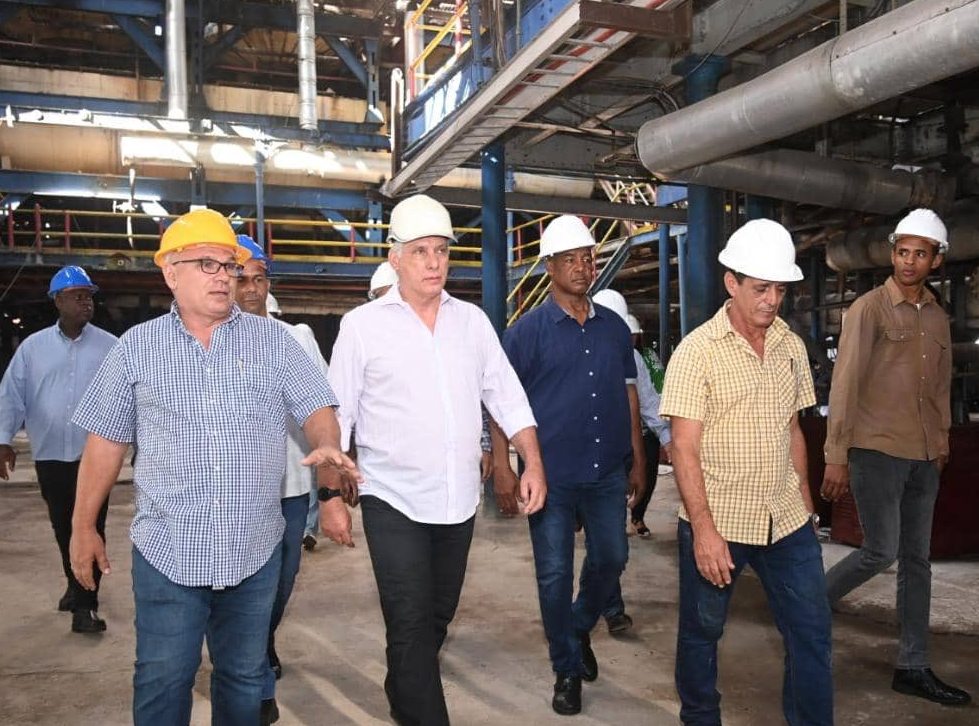
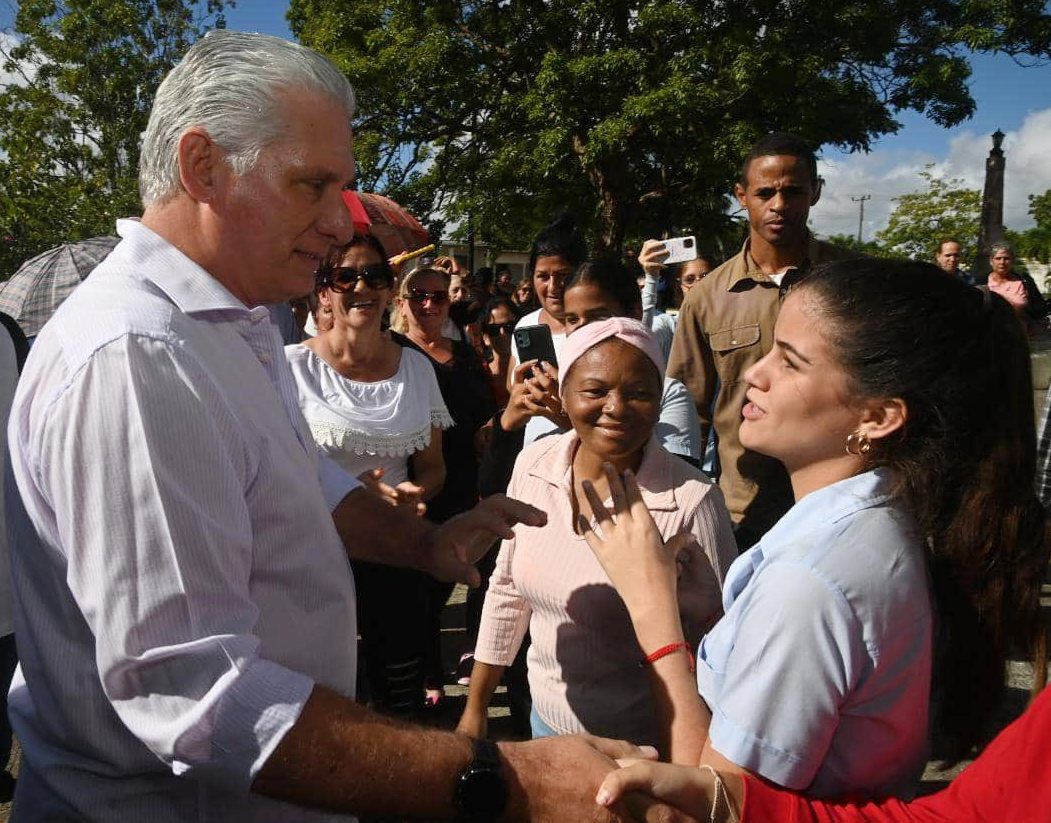
Lajas,
November 27, 2024
Visit to Ciego de Ávila Province
Among his many visits, President of Cuba and First Secretary of the Party Central Committee Miguel Díaz-Canel Bermúdez, recently visited Ciego de Ávila. His time with the people there included visits to the state-owned Sebioca small-and-medium-sized enterprise (SME), an exchange with workers of the Ciego Norte photovoltaic solar park, visits with contingents of students from the Federation of Middle School Students (FEEM) and Federation of University Students (FEU) who will take part in a national prevention exercise, and with the people of the 9 de Abril community.
Sebioca is a biofactory located next to the Máximo Gómez Báez University of Ciego de Ávila. Since January it has become a medium-sized state enterprise. Díaz-Canel was interested in the progress taking place. Sebioca has a new form of economic management and has shown encouraging results in providing high quality agamic, botanical, and biotechnologically produced seeds.
The introduction of high-yield clones, such as FHIA 04 — a variety of banana that the province did not have — and links with universities and research institutes have been decisive in the development of this factory. These links include those with the Plant Biotechnology Institute and Research Institute of the Central University "Marta Abreu" of Las Villas, and with the Tropical Roots Research Institute (Inivit).
Among the achievements this year are the sale of more than 250,000 seedlings to companies like La Empresa Agropecuaria La Cuba. This is in line with the call to apply science and innovation in the cultivation of the land and contributes directly to increasing food production.
The delegation then witnessed the flag-bearing of the Pedro Martínez Brito contingent, composed of 150 FEEM and FEU students. The students were to visit establishments and SMEs to evaluate how the measures approved by the government are being implemented. They are to share their results with inspectors, teachers and government and Party officials.
Díaz-Canel visited the photovoltaic solar power generation park under construction in Ciego Norte, with a capacity to generate 21.7 megawatts of electricity. With the completion of the site in February next year, plus synchronization with others currently under construction, next summer the province will be self-sufficient in electricity, including at midday peak hours, generated with photovoltaic energy.
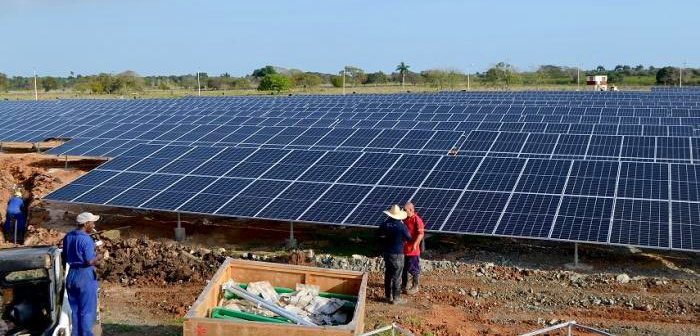
Photovoltaic
solar power generation park
The delegation also spent time with neighbours of the 9 de Abril community, which has undergone a major construction to renovate the area and thorough work in the social area, including care for vulnerable people. He praised the initiative of several companies in the region that moved closer to the communities and sold food at differentiated prices. So far this year, in just the municipality of Ciego de Ávila, these companies made available to the popular councils that govern communities more than 534 food rations. Strengthening work with the youth is also taking place.
Díaz-Canel pointed out that in challenging times, the creative resistance of the people comes to light, and the people of Ciego de Ávila show it with many daily actions. These include the increase in sowing levels, the development of the agricultural company La Cuba, the fact that the province ended the year with a surplus, and increased community work.
Visit to Los Palacios, in Pinar del Rio Province
President Díaz-Canel and other leaders visited the Tierra Brava farm on November 21, which has overcome difficulties in production. Today they have diversified production; secured a rich seed bank; and have remarkable social outreach. There are a variety of crops, including cassava, banana, and other fruit trees. The farm also exports spices and wants to do the same with nuts.
Onay Martínez Díaz, from Tierra Brava, brought out the importance of self-reliance, saying, "if the cooperative owns the seed, it has a strength; therefore, to rebuild the Cooperative we had to recover the seed. We worked with the research centers and looked at varieties from different places, to see which ones were the most resistant."
Díaz-Canel brought out that, "In the midst of the crisis they have achieved this, and that is the model of agriculture that we need, that is within our reach," and "where science, new technologies and innovation are applied." The President highlighted how the people are improving their lives and young people are involved and the collective work is an example of value to the whole country.
Vietnamese Friends Contribute to Self-Sufficiency in Rice
"There is a commitment that in the shortest possible time Cuba can be self-sufficient in rice, from assimilating your techniques and knowledge, and with your cooperation," said the president to a group of Vietnamese who live in the city of Los Palacios. Together with Cuban producers, an experimental investment project is underway with a Vietnamese company.
"We have come here to support the Cuban Homeland," said a young Vietnamese woman to Díaz-Canel, upon arriving at the Basic Business Unit (UEB) Semillas Cubanacán. It belongs to the Los Palacios Agroindustrial Grain Enterprise, where the experimental project is taking place.
The Vietnamese friends decided to build a 16-hectare experimental structure, which has now been planted. In addition, so far this year, some 300 hectares have been sown. In the same area, next year, a thousand hectares will be sown. Part of it will be done with Cuban seeds, and the other part with Vietnamese seeds.
"We have to study well the behaviour of each seed we use," Díaz-Canal said. He advocated a direct and systematic interaction between the producers of both nations, so that the Vietnamese friends with ample experience can raise all their concerns.
To the members of the UEB, he reminded them of the importance of such a productive structure having results and overcoming any inefficiency: "You are part of a prioritized program of the country, in cooperation with Vietnam. This is one of the fundamental ways we have to achieve food sovereignty."
Improvements for Santa Mónica Community
With some 450 inhabitants and 245 houses, the Santa Mónica community, in Los Palacios, has experienced changes that have impacted it for the better. It is known as a neighbourhood in transformation, where there is a family doctor's office (previously non-existent), a bakery (also newly acquired), and a cooperative whose main activity is agriculture.
As part of identifying and solving problems, there was an accountability assembly in the community. The main concerns of the residents were the issues of the roads, transportation, water supply and the state of one of the nearby bridges.
A special meeting also took place at the Clara Zetkin rural school, where the president spoke to the children about World Children's Day (November 20): "All of you have now been summoned for a debate," Díaz-Canel told them. "[I]n these assemblies you have to see how rights are being protected, and where you believe there is a violation of rights you also have to denounce it; and the teachers, the institutions, have to help solve those problems." He commended the teachers for contributing to education in a rural area.
Speaking to the people of Los Palacios more generally, Díaz Canal addressed the particularly sensitive issue of the electricity service. He said: "This situation is very complex. Yesterday was a hard day for electricity, the level of blackout in the country was very high."
The deterioration of the plants providing electricity and inability to get needed parts and fuel because of the blockade is a major problem. He brought out encouraging projects, such as the use of renewable energy sources, like the photovoltaic plant in Ciego de Ávila.
Visiting Guanajay in Artemisa Province
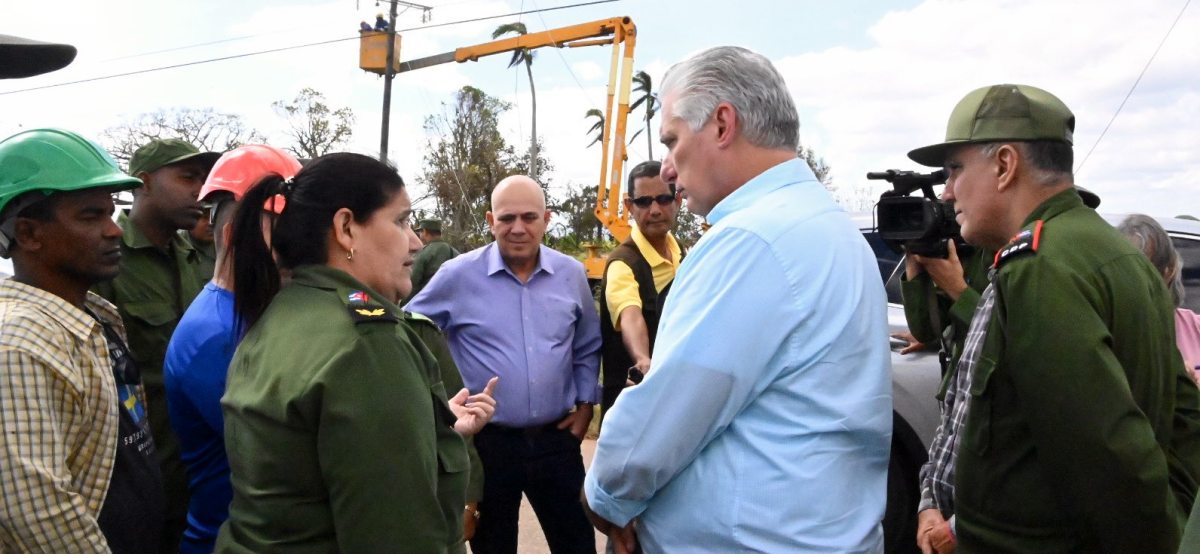
While visiting the province of Artemisa, President Díaz-Canal's first stop was in the city of Guanajay, at the People's Council #1, in the community of Cayao. A brigade from the province of Camagüey was working to restore electric service facilities.
When the president arrived with other leaders of the Party, he was updated on how the recovery process for electricity was going. The most delayed municipalities were Caimito, Alquízar, Mariel and Güira de Melena. With recovery, the estimated electric energy service for that day was expected to exceed 80 per cent.
The José Ramón Martínez Pediatric Hospital — a centre that was hit by Hurricane Rafael — was the second stop. The hospital has been working hard to restore everything that was damaged by the hurricane. Restoration was also being done by the Office of Procedures of the Defense Zone Three, in Guanajay's Popular Council #3.
Visiting the Province of Camagüey
On his visit to Camagüey, President Díaz-Canel and other leaders visited a branch of the Family Assistance System (SAF), a fish market, a bodega, and finally, a laundromat in the community, known as Lavatín. It has a good reputation. He brought out that the positive developments taking place and being sustained confirmed that by working collectively, together, the current difficulties will be overcome, and much better conditions will emerge, including improved quality and greater sensitivity to the problems of the population.
The delegation visited a food production plant that belongs to the UEB (Unidad Empresarial de Base, or Base Business Unit) known as "Estrella Roja," the province's fishing company. The plant provides more than 150 tons per month of food products, including sausages, minced meat, fresh fish, and hamburgers. The impact of this plant, whose raw material comes from aquaculture, is significant for the population. High levels of productivity have earned it a prestige that make Camagüeyans proud.
They also visited the Villa Luisa farm — with 12.4 hectares of fruit trees and short-cycle intercrops — which is one of the 115 farms that are part of the province's Green Ring. Over a period of nine years, the farm has become highly productive, with 1,300 mango trees, 6,000 guava trees, 400 coffee trees, and more.
"Look at the culture of work here," Díaz-Canel said with admiration. Villa Louisa has direct links with the company to which it belongs: the agro-industrial company "Camagüey." There, where the land has been developed to the maximum, one can see the great wisdom of the people, something Cuba has in abundance.
(With files from Granma, edited for style and grammar by TML.)
Ottawa
Discussion on
Current Situation in Cuba
with Representative of
Cuban Embassy
A discussion with Dany Tur, Counselor and Deputy Head of Mission at the Embassy of Cuba in Canada, was organized by Ottawa-Cuba-Connections on November 22.
Dany opened the discussion by speaking of the urgent need to end the U.S. economic, commercial, and financial embargo against Cuba. He spoke of the October 30 UN General Assembly vote on Cuba's resolution against the blockade, which the Cuban Foreign Minister denounced as a crime of genocide. For the 32nd time, the resolution was passed, with 187 countries voting in favour, and two — the United-States and Israel — voting against.
Dany also highlighted some of the points made in Cuba's report Tumba el bloqueo (Tear Down the Blockade) which offers concrete numbers as to the damage caused by the U.S. blockade in Cuba between March 2023 and February 2024. In that period, the blockade caused material damages and losses to Cuba estimated to be more than $5 billion. Considering the value of the dollar against the value of gold in the international market, the blockade has caused quantifiable losses of about $1.5 trillion.
Dany said that the tourism industry -- an important economic sector which allows Cuba to invest in health and education -- has been specifically targeted by the U.S. The U.S. has sanctioned 231 tourism-related entities using extraterritorial measures, like the Helms-Burton Act, which are part of the blockade. The U.S. illegally and unjustly uses these to blackmail and sanction other countries and companies to keep them from doing business with Cuba. The U.S. continues using various efforts to harm the Cuban economy and the very lives of the Cuban people. This is accompanied by a media campaign to stop people from visiting Cuba with false claims that it is not a safe destination.
Dany also gave a brief historical overview to highlight both the Cuban people's struggle to attain their independence and efforts by the U.S., dating back to 1898, and even before. John Quincy Adams was instrumental in development of the Monroe Doctrine of 1823, when the U.S. declared all the Americas its domain and European colonial powers had better stay out. Cuba was a crucial part of this. Adams, as President from 1825-29 spoke of taking control of Cuba whenever the fruit would be ripe to pick. This occurred in 1898, in the war against Spain and Cuba, when the U.S. also seized and colonized the Philippines and Puerto Rico and annexed Hawaii.
During the discussion, some raised the matter of renewable energy, and Dany explained that Cuba does have renewable energy projects, and that it aims to reduce its dependency on oil. He said that given the growing intensity of natural disasters and the fact that the island is threatened with partial destruction by sea erosion, the struggle against climate change is of utmost importance for Cuba.
Some said that they appreciated that Cuban President Miguel Díaz-Canel and government representatives were on the ground following hurricane Rafael and two earthquakes, and asked how things are organized both before and after such disasters. Dany pointed out that before Rafael struck, Cuba's highly organized Civil Defense teams evacuated 200,000 people to safety and acted immediately afterwards to deal with the destruction affecting the power grid, farmland, and more. The main preoccupation is to avoid the loss of human life. "The most important factor is the people," he said.
Participants in the meeting used the occasion to make contributions to the Cuban emergency relief fund established by the Canadian Network on Cuba.
Toronto Forum on Cuba Honours Fidel Castro
Toronto Forum on Cuba organized a meeting on the evening of November 25 to honour the legendary leader of the Cuban people, Fidel Castro, on the anniversary of his passing eight years ago.
The invitation for the event noted: "Fidel Castro Ruz, the historical leader of the Cuban Revolution, passed away on Nov. 25, 2016. The global impact of his thoughts and actions still resonates and will resonate throughout the world because of his commitment to the just causes of humanity anywhere and anytime."
|
Toronto Forum on Cuba organizer Morteza Gorgzadeh opened the meeting. He praised the historic contribution, great revolutionary spirit, and leadership that Fidel has left behind as a legacy to Cubans and the world's people. This legacy is especially important for the Cuban people as they face, with courage and dignity, the U.S. Blockade and the many challenges this causes for Cuban society.
Representing the Cuban Consulate in Toronto was Consul Tania Valenzuela Veiga, who brought the greetings of the Cuban people to the gathering. She also introduced the new Consul to Toronto, Aneylín Ruíz Casas. She said the Cuban people feel Fidel's presence vividly in their lives every day.
The Consul also encouraged all to participate in a demonstration at the U.S. Consulate on December 1 to denounce the U.S. criminal blockade against Cuba, and to remember Fidel.
The cultural program included a passionate performance of two patriotic Cuban songs by musician Juan San Martin.
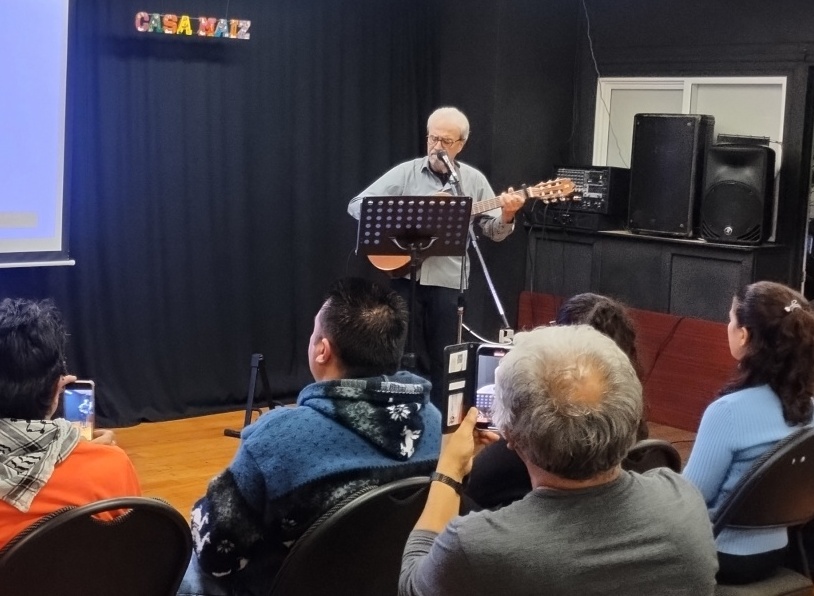 There were also two videos shown: one was a collage of mass
performances of the song "Cabalgando con Fidel" (Riding with Fidel).
The other was a new video, a tribute to the Cuban civil defence crews
and the Cuban people valiantly working to recover from the recent
devastating hurricanes and
overcome the demanding situation Cubans face.
There were also two videos shown: one was a collage of mass
performances of the song "Cabalgando con Fidel" (Riding with Fidel).
The other was a new video, a tribute to the Cuban civil defence crews
and the Cuban people valiantly working to recover from the recent
devastating hurricanes and
overcome the demanding situation Cubans face.
Those who attended the meeting stayed for discussion afterwards to learn more about life in Cuba and the situation in Cuba today.
(To access articles individually click on the black headline.)
Website: www.cpcml.ca • Email: editor@cpcml.ca

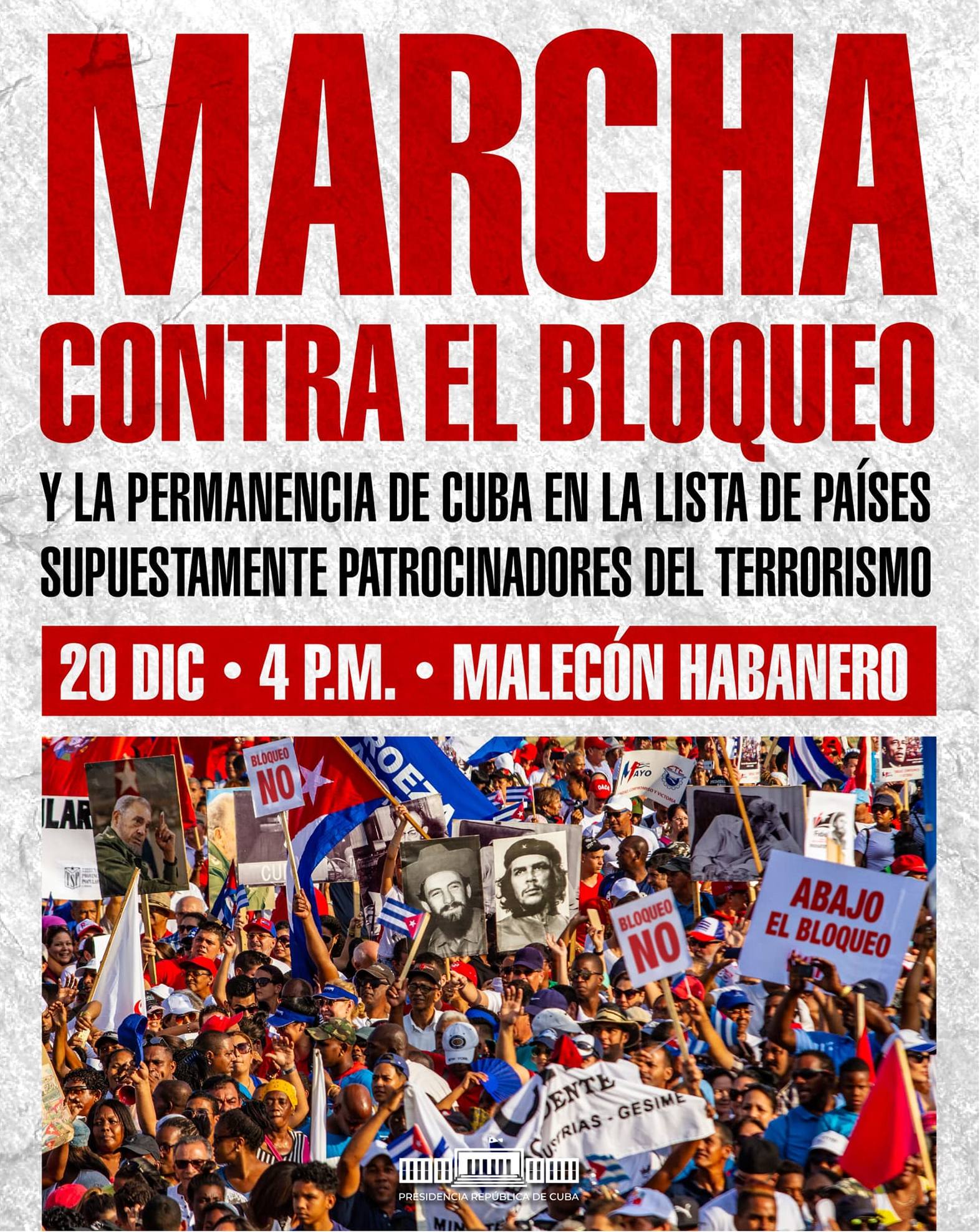

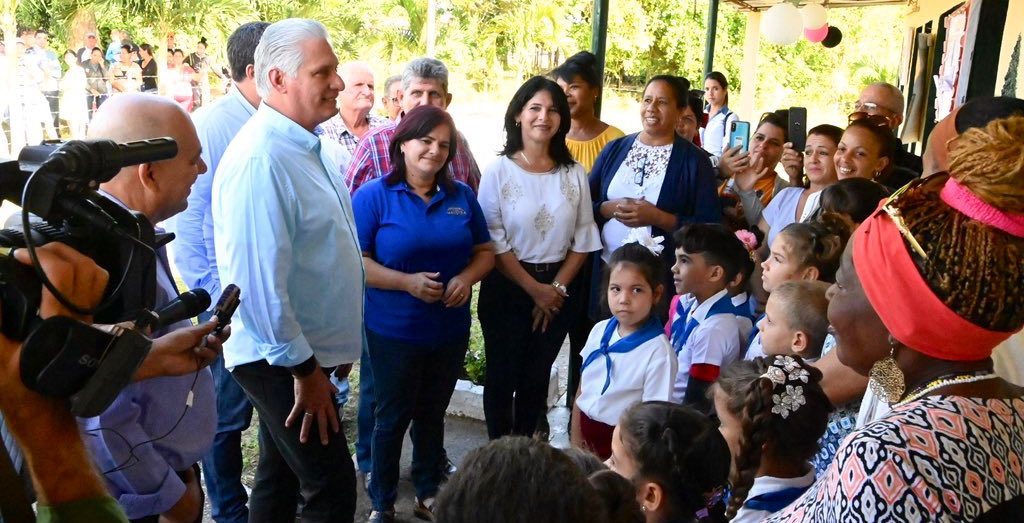
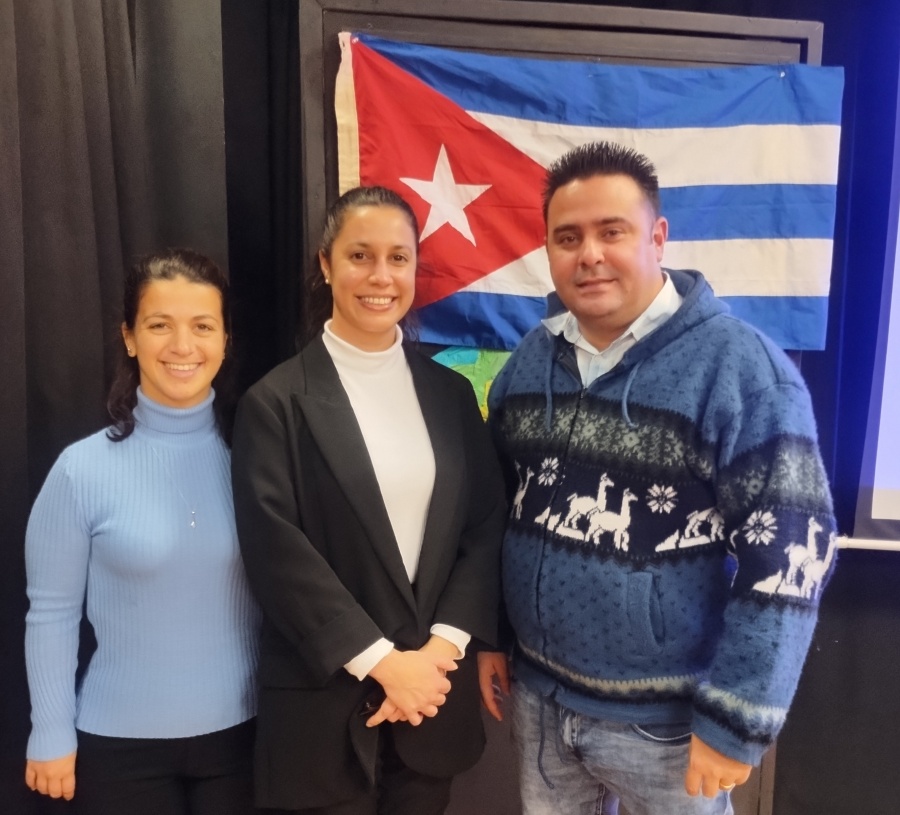 New
Consul to Toronto Aneylín Ruíz Casas (left), current
Consul Tania Valenzuela Veiga (middle), and Consular staff member
New
Consul to Toronto Aneylín Ruíz Casas (left), current
Consul Tania Valenzuela Veiga (middle), and Consular staff member